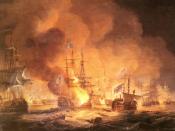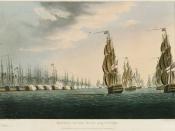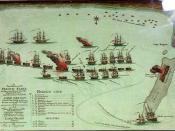The Battle of the Nile was one of the most decisive naval battles to ever have been played out - in one night it altered the course of world history, denying Napoleon his Eastern Empire, and crippling him at sea. For its victors, the British under Admiral Nelson, it was also a textbook example of daring inventiveness, unconventional warfare, and the power of individual initiative. The Battle of the Nile did not strengthen Napoleon's reputation as a military leader because his loss at Aboukir meant that his fleet was no longer something to be feared at sea, it cut off Napoleon from conquering the rest of Egypt, and the performance of his fleet was a disgrace to the absent war hero himself.
Until the Battle of the Nile, Napoleon's fleet of battle-hardened warships were unrivaled at sea. Many opposing fleets would either turn mast and run from the great Napoleonic fleets, or call in reinforcements to fight a losing battle.
Originally the Battle of the Nile was meant to be a reconnaissance mission for the British fleet under the young and daring Admiral Nelson, but after the French fleet was sighted just east of his current position, Nelson rushes to engage Napoleon's armada. Now people knew it was possible to defeat Napoleon and thus fought with a new passion. Napoleon's defeat in Aboukir Bay meant that his forces were no longer the rulers of the seas and it crippled his Egyptian Campaign.
Napoleon's defeat at the Battle of the Nile meant that the British now ruled the waterways surrounding Egypt, which crippled the French's advance eastward. This was a major blow to Napoleon because it meant that he would have to assault Asia by land and face the cold Russian winters. But after the defeat Napoleon's dreams...


